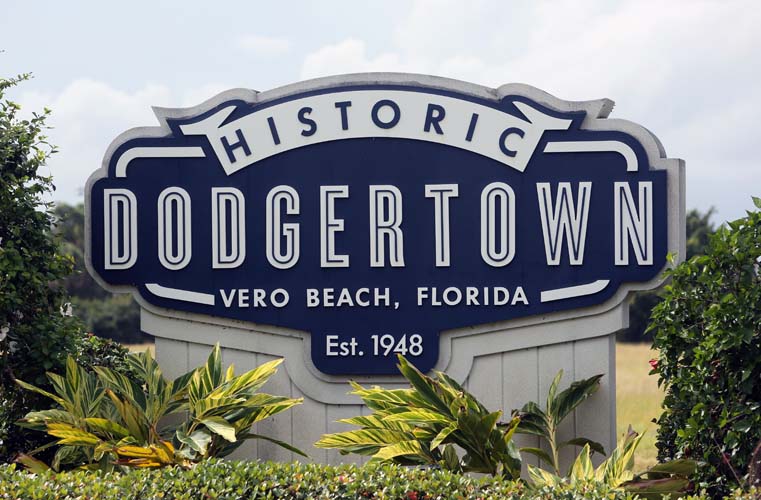Peter O’Malley’s lifelong affection for Vero Beach and connection to Dodgertown has been well-chronicled, especially in recent years, as he fought to make sure Vero Beach’s once-iconic spring-training complex didn’t dissipate into a foggy baseball memory.
That’s why the former Los Angeles Dodgers owner rode to the county-owned facility’s rescue in 2011, putting together a five-way partnership that pumped money and life into the place, preventing it from being shuttered after Minor League Baseball failed to turn a profit and announced it was pulling out.
That’s why O’Malley made it his mission last year to find a successor to take over Historic Dodgertown’s multi-sport operations, which county officials say has a $15 million annual impact on the local economy.
That’s why O’Malley, at age 80, was genuinely thrilled to learn last week that his efforts to bring together the county and Major League Baseball were successful – that the two parties had agreed in principle on a long-term lease for Historic Dodgertown.
“The two sides have made great progress,” O’Malley said. “I think it’s going to happen, and I’m glad it’s going to happen. This is the best possible outcome for the county.
“When everything is final and the lease is signed, I’ll happily hand the keys to Major League Baseball and offer to help in any way I can.”
According to County Administrator Jason Brown, the county has a “handshake agreement” with MLB, which, if the deal is finalized, would assume control of Historic Dodgertown’s operations and make Vero Beach the hub of its youth programs.
Brown said the proposed lease is for 10 years, with three five-year options – a deal that requires the county and Major League Baseball to share the costs of renovating and making other improvements to the aging facility.
Brown hopes to present the lease to the Board of County Commissioners in early December, after lawyers from both sides review the agreed-upon, five-page term sheet and draw up the necessary paperwork.
“They’re still working on the language, but I don’t anticipate anything going wrong,” Brown said. “I’m quite comfortable recommending the lease be approved, and I’m confident the board will approve it.
“Major League Baseball has indicated they’re in this for the long haul.”
Once signed, O’Malley’s lease with the county would immediately be terminated – it expires in May, anyway – and Historic Dodgertown’s operations would be in MLB’s hands for at least the next decade.
Brown said the county has agreed to pay to renovate the facility, which is in need of several new roofs, repairs to Holman Stadium’s press box, and other “deferred maintenance” before MLB arrives later this year.
“Those projects needed to be done, anyway, for anybody to continue to operate the facility,” Brown said, adding that the county currently spends roughly $325,000 annually on maintenance there.
MLB will then contribute up to $10 million in improvements – including $5 million for an indoor practice field – with the county matching up to half that amount in reimbursements over the duration of the 10-year lease.
Brown said the county will use sales and tourist tax revenues to cover the reimbursements, which could run as high as $800,000 annually through the first five years of the lease, then dropping to a maximum of $400,000 annually through the last five years.
“Major League Baseball wants to preserve the business already there and enhance the operations by bringing in its own programs and activities,” Brown said. “With their resources, the calendar is only going to get fuller, which will increase an already-significant impact on the local economy.
“As Major League Baseball gets things going here, we expect that $15 million annual impact to grow.”
MLB is expected to bring to Historic Dodgertown activities and tournaments related to its youth programs, such as Reviving Baseball in Inner Cities, Youth Academy and Elite Development Invitational.
O’Malley said MLB is familiar with the facility – where the players can eat, sleep and play on campus – because it has held programs there each of the past three years.
Brown said MLB wants to embrace the history of the complex, which was the spring training home of the Dodgers, from Brooklyn to Los Angeles, from 1948 to 2008, when the team moved its preseason headquarters to Arizona.
“That’s what drew them here, especially the ties to Jackie Robinson,” Brown said, referring to the former Dodgers great who broke baseball’s color barrier in 1947.
“Major League Baseball is well-positioned and well-suited to elevate that history to a national stage, which would increase the county’s exposure.”
Brown said the agreement requires the county to provide 2,000 parking spaces for MLB events at Holman Stadium – an obligation that likely will prompt the county to make another attempt to buy the former Dodgertown Golf Club property from Vero Beach.
The City Council rejected the county’s $2.4 million offer last month, deciding to keep the 35-acre parcel as open space. A developer offered $2.43 million in hopes of building an urban market that included a hotel, office buildings and restaurants.
O’Malley encouraged the county to try again to buy the property, thus assuring the overflow parking MLB needs.
The county currently has a parking agreement with the city to use the property when necessary.
Brown said the county is fortunate to have O’Malley as an ally who used his connections and influence to attract MLB, which he said is a “perfect fit and the best possible partner to write the next chapter for Historic Dodgertown.”

